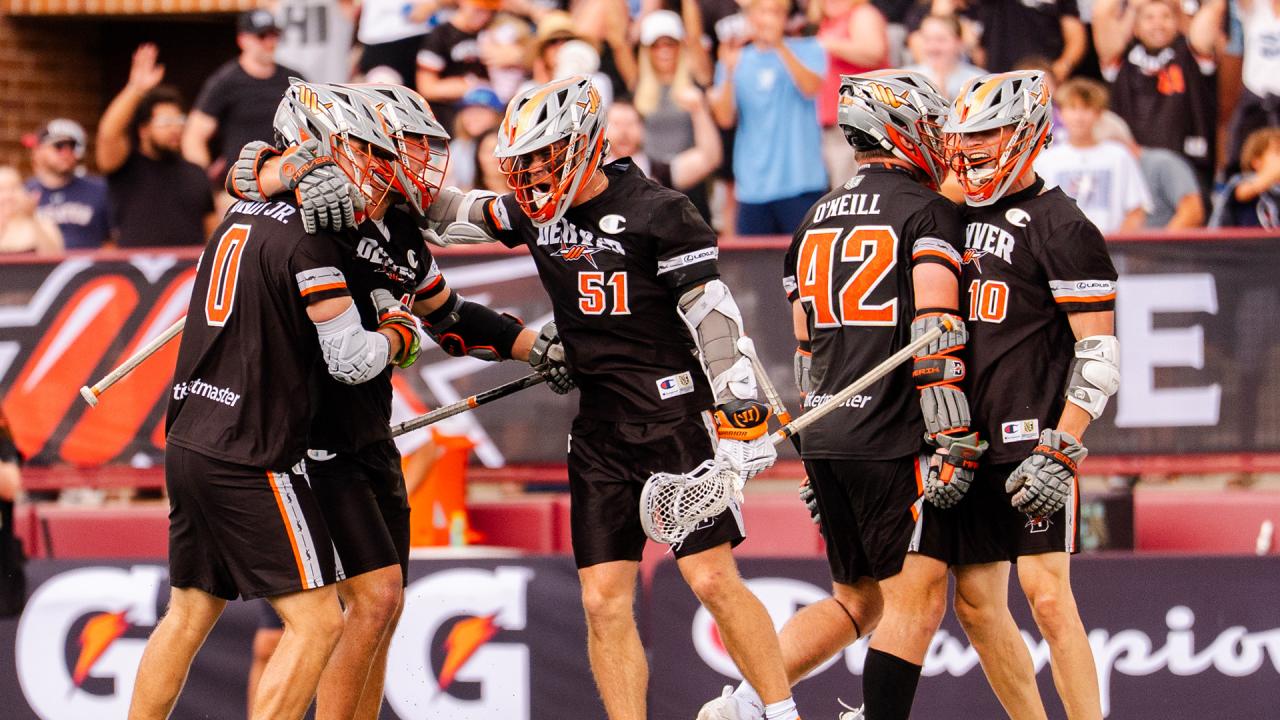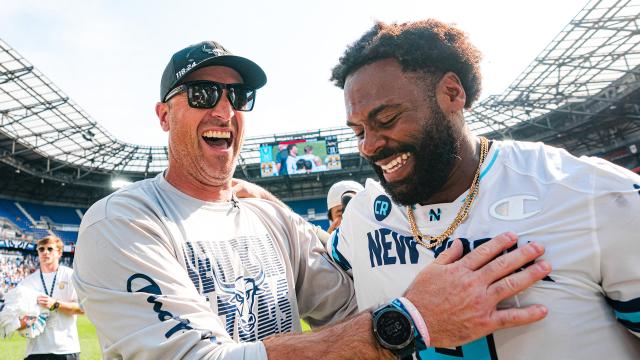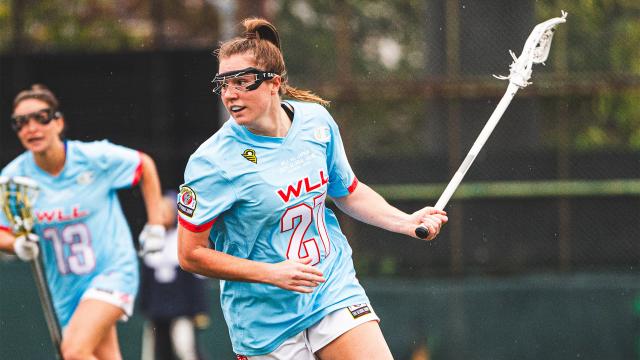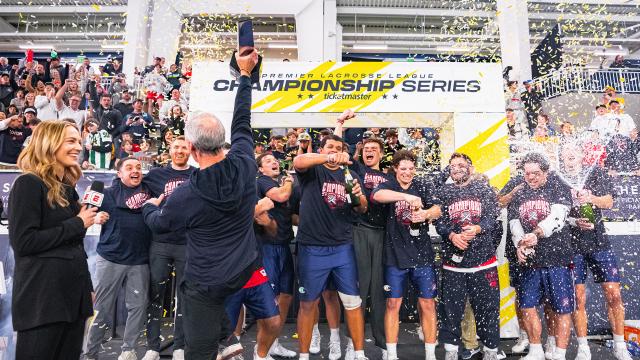
PLL Semifinals Primer: X-Factors, Matchups and Predictions
A roaring comeback from the California Redwoods and a remarkable performance from the Philadelphia Waterdogs’ attack line last weekend earned both teams a bid to Monday’s Premier Lacrosse League semifinals just outside Philadelphia.
Both wins were significant in the history of their respective franchises. The Redwoods’ win marked their second playoff win since 2019 and the first for head coach Anthony Kelly and general manager Joe Spallina with the Woods.
The Waterdogs’ win, which snapped a four-game losing skid, was the first playoff win of Bill Tierney’s professional coaching career. Philadelphia won just three games last season and is now a win away from returning to the PLL championship game for the third time in the past four seasons.
Let’s dig into the semifinal matchups.
Denver vs. California
After a slow start offensively last week, California eventually settled in and did what it does best — get the ball to its star-studded rookies. Midfielder Andrew McAdorey scored a career-high four goals, and Chris Kavanagh registered his third consecutive game with at least a hat trick.
Denver heads into Monday’s matchup having not played a competitive game since Aug. 2, a break so extensive that it’s hard to argue that it’s actually beneficial for a healthy roster.
X-factor for Denver: Start fast
Let’s face it, even with players like Dylan Molloy and TD Ierlan, the Redwoods are at a significant talent disadvantage. But that’s a narrative the team has heard all season, and now that September is here, the Redwoods are still alive. Monday’s game will be California’s biggest test yet.
The Outlaws just needs to avoid getting sucker punched, and if they do, they need to fight back quickly.
X-factor for California: Control the pace
Since rookie Logan McNaney took over as the starting goalie for the Outlaws during in week three, Denver has operated its transition offense at an outstanding rate. Having transition midfielders like Jake Piseno and Ryan Terefenko along with an attack line featuring Pat Kavanagh and Brennan O’Neill helps that cause, but McNaney is at the forefront.
At the end of the regular season, PLL statistics tracked McNaney’s clean save rate at 58 percent, which was by far the highest in the league. All those clean saves have stacked up and also led to McNaney having the league’s highest team quick clear efficiency.
The Redwoods need to be cognisant of their shot selection, as one bad shot could lead to a point, or two, in a hurry.
California’s offense vs. Denver’s defense
It’s been over two months since these teams met, and both are drastically different. California won its opening game 15-12 over an Outlaws squad without Jared Bernhardt and McNaney, while Denver got its payback four weeks later as its roster took shape.
Still, in both games, California registered at least 12 goals. Denver finished third in the league in scores allowed per game (11.3), while the Redwoods offense finished fourth in scores per game (12.6). One of the league’s best cover defenders, JT Giles-Harris, will presumably match up against Chris Kavanagh, while veteran defendsemen Jesse Bernhardt and Mike Manley will fittingly be left to cover Ryder Garnsey and Molloy.
Where things get more interesting is in the midfield. McAdorey has emerged as one of the hardest speed dodgers to cover in the PLL. Fellow rookie Josh Balacarcel has found success when inverting behind the cage, but the Outlaws’ depth in the defensive midfield is impressive. Long-stick midfielders Piseno and Nick Grill have been productive, and Terefenko is one of the hardest short sticks to dodge against in the league. Redwoods rookie midfielder Sam English could also make his return from injured reserve, which would add a needed two-way presence to California's midfield.
Denver’s offense vs. California’s defense
Denver’s 18-goal onslaught during these two teams’ last outing was the performance that sparked the its remarkable regular season. They Outlaws have averaged 13.6 goals per game and have only lost one game since that performance. Despite having so many players who can play quarterback and operate an offense on their own, Denver has found a successful equilibrium, allowing Bernhardt, Kavanagh and O’Neill’s skillsets to operate in harmony.
Can California’s defense slow them down? Time will tell, but last week’s X-factor, Redwoods goalie Chayse Ierlan, will almost certainly have to hone in another great performance. Ierlan failed to stop 50 percent of his shots faced during his past two matchups against the Outlaws.
Score prediction: Denver wins 18-14
New York vs. Philadelphia
Two of the league’s most polarizing offenses are set to face off against each other. The last time the Waterdogs and New York Atlas met, they set a new PLL record for goals in a game. The Atlas eked out a 20-19 victory as the Waterdogs clinched the playoffs over the Cannons due to goal differential.
X-factor for New York: Reid Bowering
Since becoming a mainstay on the Atlas offense this season, Bowering’s importance has been second to none — even on an offense with Jeff Teat and Connor Shellenberger. He plays a vital role in the two-man game alongside Teat as a slick off-ball manipulator and talented inside finisher.
That’s been precisely Philadelphia’s problem this season on defense. If the Waterdogs don’t communicate or handle New York’s picks well enough, it’ll be a really long day for them.
X-factor for Philadelphia: Embrace the pace
One of the most drastic statistics of the PLL regular season came from PLL data analyst Pat McKeever, who showed that New York had the league’s most efficient defense during the 52-second shot clock but the worst during the 32-second shot clock. It’s worked for the Atlas so far, so they haven’t felt the need to switch up their philosophy regarding their 32-second defense.
Against Philadelphia, they should. The Waterdogs offense has been electric since rookie CJ Kirst was moved to attack, and they have the firepower to counter New York’s offense. Expect rookie long-stick midfielder Ben Wayer to also let two-point shots fly.
New York’s offense vs Philadelphia’s defense
Shellenberger versus Waterdogs primary defenseman Kenny Brower is a matchup avid lacrosse fans have been watching for years. The two faced each other annually, sometimes multiple times a year, when Shellenberger played at Virginia and Brower played at Duke.
Outside of an ugly stretch during the middle of the second half, the Waterdogs defense seemed to have taken a leap last week against the Whipsnakes. They entered that matchup with the PLL’s second-worst defense in goals allowed per game (12.7). Last week’s X-factor for the Waterdogs was off-ball defense, and it easily could’ve been again. One wrong turn of a defender’s head and one of the Atlas’ elite passers will zip a pass right by them.
Philadelphia’s offense vs New York’s defense
The Atlas defense was one of the bigger surprises this season. As previously stated, they’ve arguably been the league’s toughest defense to score against during 6-v-6 sets, and having Liam Entenmann in the cage certainly helps. MVP finalist Michael Sowers matching up with Defensive Player of the Year finalist Gavin Adler also feels like a great advertisement for an ESPN+ subscription.
Philadelphia’s offense has been on another level lately, though. The Atlas had to score 20 goals to beat them last time out, and they’re still improving. If the Waterdogs can get midfielders Connor Kelly and Jack Hannah involved this time around, they could have enough support to pull off the upset — but it’ll be tough.
Score prediction: Atlas win 16-15
Hayden Hundley
Hayden Hundley has been involved with lacrosse since he was 6 years old and was brought on as Editorial Intern at USA Lacrosse in May 2025. He has covered Virginia men’s lacrosse with Streaking the Lawn, scouted DMV talent with Prep Lacrosse and was formerly the Sports Editor for James Madison’s student newspaper "The Breeze."

Categories
Tags
Related Articles




